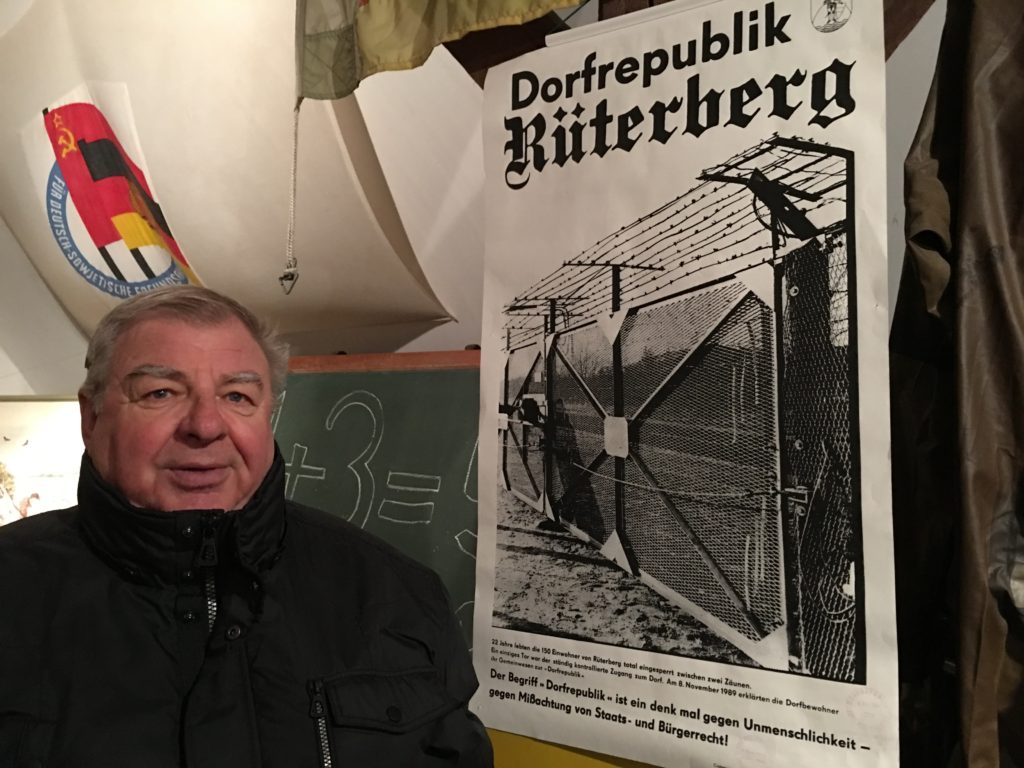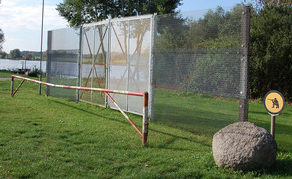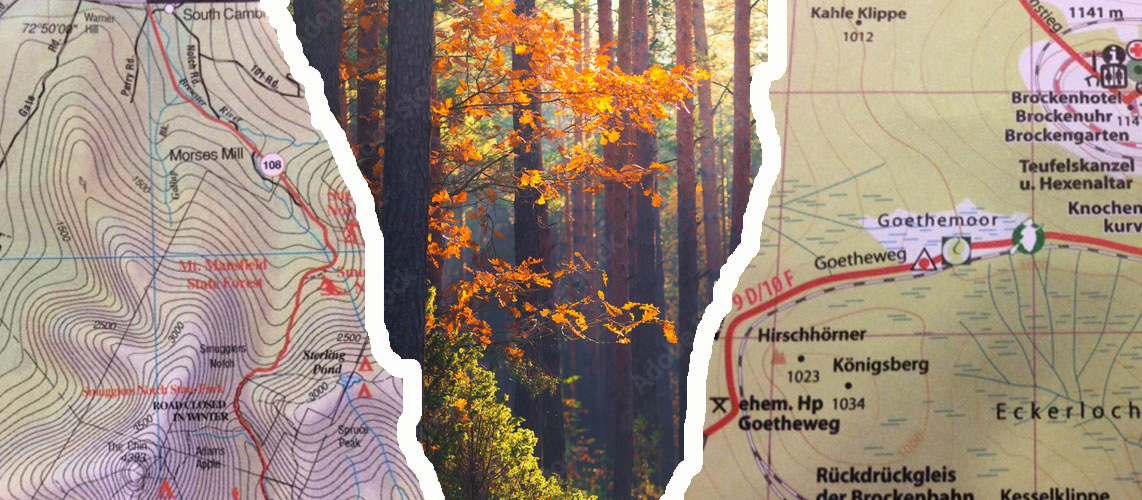Today’s excerpt from Chapter 8 also takes place in Rüterberg, the little village on the German-German border that was doubly fenced-in. If you missed last week’s posting on why, you can catch up here. In today’s excerpt, find out about the border violation committed by the former mayor and his wife, and what it was like to live under the watchful eye of the Stasi.

“One time we – my wife and I – were involved in a real border incident, together with our village policeman,” Herr Schmechel continued. “We committed a border offense, you could say. We were walking home together with our ABV [the village policeman] from a dinner in the village, towards the fence because the policeman lived near there, and all at once we heard screams. You know, when somebody screams for their life, it makes your hair stand on end. So we walked over to the fence and it was coming from the other side, right near the small gate, and we could hear water sloshing. It was dark and we couldn’t see anything, but we knew there was a small water hole on the other side. And then the border guards came. So we said ‘Open the gate so we can get this guy out!’ And the border guards said ‘No, we’re not opening the gate,’ and they left. So the police officer ran to his house to get a crowbar, and we broke the lock on the gate open with that.
“We got him out, and he could barely walk. We took his clothes off – “
“It was January! He was almost frozen in his wet clothes,” Frau Schmechel called over from the sofa.
“When he finally could talk, it turned out he was Czech,” Herr Schmechel took over the story again. “He spoke no German, we spoke no Czech, but with hands and feet we found out that he had fallen off a river barge [on the river Elbe]. They had been drinking, and he went overboard. Then he drifted ashore here and stumbled into the water hole in the dark. We got him to the ABV’s house, put some dry clothes on him. And then the border guards came. There must have been thirty of them, and they formed a ring around the house. The guards who had seen us at the gate had reported it up the chain right away. And they tried to take the guy, but my wife said ’He’s not going anywhere until a doctor has looked at him.’”
That must have taken some guts, I thought, to talk back to a border guard like that. But the guards had called a doctor.
“A few days later they [the party] wanted to fire our sheriff [the village police officer] because he had violated the border. Not a word about him, or us, saving a life.”
Or, I thought to myself, about the border guards showing complete disregard for the man who was screaming for his life.
“So I told them it had been only us – my wife and me – who went through the gate to get him. And they told us we were Grenzverletzer (border violators). They knew as well as we did that it was only the fence we had crossed, not the actual border. That was still GDR soil on the other side [the so-called outside sovereign territory]. But they weren’t interested in that. But in the end they didn’t do anything to us.”
I had noticed the broad North German accent when Herr Schmechel spoke, more like the way people spoke along the coast. And indeed, he told me that he had grown up on an island in the Baltic Sea. He had come to Rüterberg as a young border guard in 1966 and had fallen in love with a local woman – Gisela, his wife of close to fifty years now.
“Becoming a Rüterberger was not easy; even after we were married and had kids,” he said. “The ties among the people here are very strong. But once you’re accepted, you’re in for the rest of your life.”
“What about the Stasi? Didn’t that ruin any trust?” I asked.
“They pretty much knew everything about us, but the good thing in retrospect is, we found nothing in the Stasi files [after Reunification] about spying among us villagers. We had an amazing Zusammenhalt (sense of community). We didn’t really talk about the GDR and all that nonsense, maybe with very close friends, but you never knew… and half the village was either volunteer police or border assistants…Many were forced into that. Ja, things weren’t always easy.”
What an understatement, I thought. Even for a Gemütsmensch, the stress must have been a constant undercurrent.
“We were basically this little heap of people, doing everything together, and we felt like we were trying to create something together, too. Yes, that kind of sticking together is rare, I don’t think we’ll have that again.”
I had heard this from other people who had grown up in the GDR, too, that they missed the sense of community they had experienced – though none of those people had lived in the Schutzstreifen (the 500 meter “protective zone”) as far as I knew. For West Germans, this may be one of the hardest things to comprehend about their fellow citizens from the former GDR: that there could have been anything to appreciate in a life lived under the shadow of the Stasi. Ever so slowly, I was beginning to get glimpses of this possibility.
Perhaps it required a special frame of mind, I thought. “The test of a first-rate intelligence is the ability to hold two opposed ideas in mind at the same time and still retain the ability to function,” F.Scott Fitzgerald had written in 1936. The GDR did not yet exist then, but Fitzgerald’s words circled around the back of my mind as I was listening to these stories of oppression and creativity, surveillance and Zusammenhalt.


Courageous citizens in difficult circumstances. I found this story inspirational.
I agree that these people’s story of community bonding and the rescue is inspiring! I would imagine that it is helpful to them and their relatives to hear the appreciation!
Great writing Kerstin!
Thanks Brad! I did send that chapter to the Schmechels.
Speaking truth to power – we need more of that!